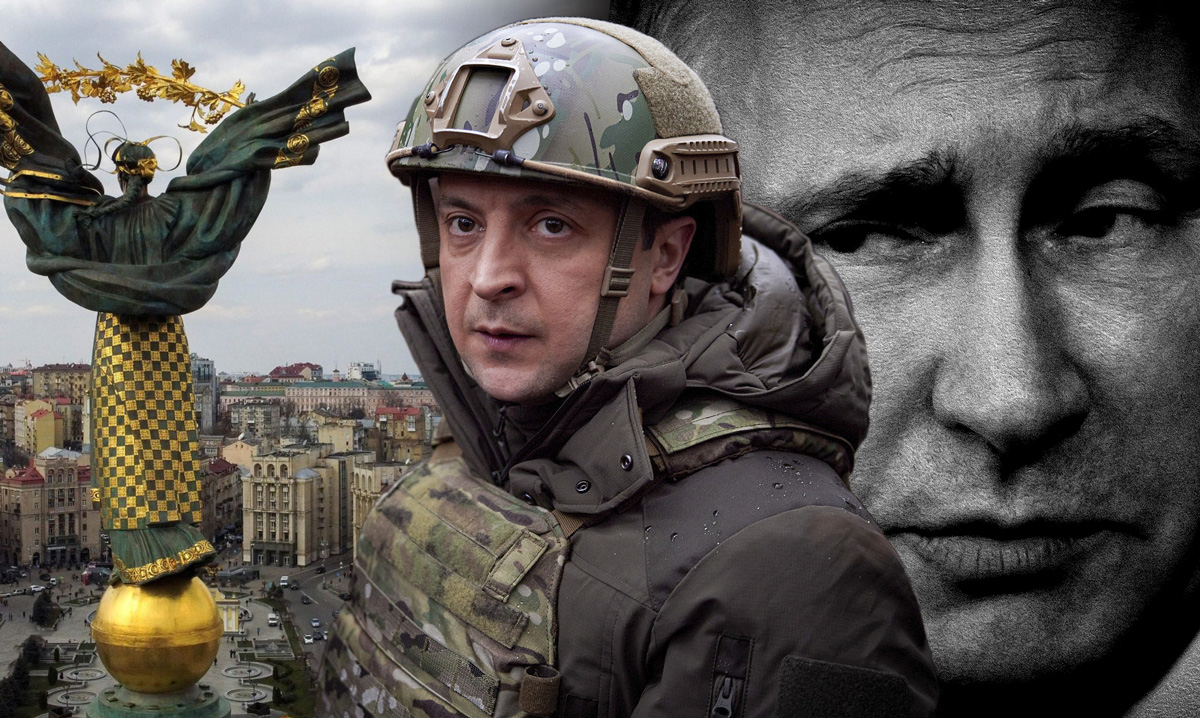
Above: Photo Collage / Lynxotic
“They have moved to a new stage of terror in which they are trying to physically eliminate representatives of legitimate local Ukrainian authorities,” said the Ukrainian president.
Ukrainian President Volodymyr Zelenskyy on Saturday accused Russia of committing “a crime against democracy itself” by abducting the mayor of Melitopol, a city in southern Ukraine that Russian troops seized in the early days of the invasion.
“This is obviously a sign of weakness of the invaders,” Zelenskyy said during a press conference, praising Melitopol Mayor Ivan Federov as someone “who bravely defends Ukraine and the members of his community.”
Russian forces, Zelenskyy warned, have “moved to a new stage of terror in which they are trying to physically eliminate representatives of legitimate local Ukrainian authorities.”
“The capture of the mayor of Melitopol is, therefore, a crime, not only against a particular person, against a particular community, and not only against Ukraine,” he continued. “It is a crime against democracy itself.”
According to Ukrainian officials, Russian soldiers “put a plastic bag” on Fedorov’s head and abducted him from the Melitopol city center on Friday, outraging local residents who turned out to protest the alleged kidnapping.
“Return the mayor!” townspeople shouted during a demonstration on Saturday. “Free the mayor!”
The New York Times reported that “nearly as soon as people gathered, the Russians moved to shut them down, arresting a woman who they said had organized the demonstration, according to two witnesses and the woman’s Facebook account.”
Across Europe on Saturday, thousands of people took to the streets to protest Russia’s deadly assault on Ukraine, which shows no sign of abating after entering its third week.
German Chancellor Olaf Scholz and French President Emmanuel Macron both spoke with Russian President Vladimir Putin by phone on Saturday, urging him to broker an immediate ceasefire and move toward a diplomatic resolution in Ukraine—but there was no indication that Putin was prepared to heed their demands.
“The conversation is part of ongoing international efforts to end the war in Ukraine,” a spokesperson for the German government said in a statement.
The Elysée, meanwhile, described the phone conversation with Putin as “very frank and difficult.”
The call came as Ukrainian officials braced for a potentially massive Russian assault on the capital city of Kyiv, which has thus far fought off Russia’s incursion attempts. The Associated Press reported that fighting “raged in the outskirts of the capital” as Russian forces continued bombarding and shelling other Ukrainian cities, including the strategic port of Mariupol.
“In Irpin, a suburb northwest of Kyiv, bodies lay out in the open Saturday on streets and in a park,” according to AP.
The U.K. Ministry of Defence has assessed that “the bulk of Russian ground forces” are now roughly 25 kilometers from the center of Kyiv. Mykhailo Podolyak, an adviser to Zelenskyy, declared Friday that Kyiv is “ready to fight.”
Zelenskyy himself said Saturday that “if there are hundreds of thousands of people, who are now being mobilized by Russia, and they come with hundreds or thousands of tanks, they will take Kyiv.”
“We understand that,” he continued. “How Ukrainian people have resisted these invaders has already gone down in history. But we have no right to reduce the intensity of defense, no matter how difficult it may be for us.”
Originally published on Common Dreams by JAKE JOHNSON and republished under a Creative Commons (CC BY-NC-ND 3.0)
Related Articles:
- Is 2023 the year for Virtual Reality Workouts?
- Fitness with Apple Watch: A Day in the Life of Highly Motivated Ring Closers
- Goodbye Twitter, Hello Mastodon!
- The Vision of Steve Jobs for the Future of Apple has Barely Begun to Emerge
- Is This Jason Statham Video Real or Deepfake TikTok Account? You Decide
Enjoy Lynxotic at Google News and Apple News on your iPhone, iPad or Mac.
Find books on Music, Movies & Entertainment and many other topics at Bookshop.org
Lynxotic may receive a small commission based on any purchases made by following links from this page